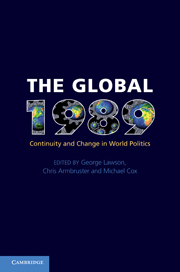Book contents
- Frontmatter
- Contents
- List of figures
- List of tables
- Notes on contributors
- Acknowledgements
- List of abbreviations
- Introduction: the ‘what’, ‘when’ and ‘where’ of the global 1989
- Part I What and when
- Part II Where
- 4 Transatlantic relations in the shadow of the Cold War
- 5 Third World socialism: 1989 and after
- 6 Towards a global Europe?
- 7 Restoration and convergence: Russia and China since 1989
- 8 One world, many cold wars: 1989 in the Middle East
- Part III Continuity and change
- Conclusion: was there a global 1989?
- Bibliography
- Index
8 - One world, many cold wars: 1989 in the Middle East
Published online by Cambridge University Press: 05 June 2012
- Frontmatter
- Contents
- List of figures
- List of tables
- Notes on contributors
- Acknowledgements
- List of abbreviations
- Introduction: the ‘what’, ‘when’ and ‘where’ of the global 1989
- Part I What and when
- Part II Where
- 4 Transatlantic relations in the shadow of the Cold War
- 5 Third World socialism: 1989 and after
- 6 Towards a global Europe?
- 7 Restoration and convergence: Russia and China since 1989
- 8 One world, many cold wars: 1989 in the Middle East
- Part III Continuity and change
- Conclusion: was there a global 1989?
- Bibliography
- Index
Summary
Introduction
1989 is, rightly, regarded as a momentous year in the history of modern world politics. By its end the twin logics of the Cold War – superpower geopolitical rivalry and ideological antagonism – no longer dominated international relations as they had done since the collapse of the wartime grand alliance. The geopolitical and ideological reordering of Europe signalled by the overthrow of communist power in East-Central Europe was quickly globalised, as the effects of the changes unleashed within Europe rippled across the world. Whilst this assisted the resolution of a number of regional conflicts involving the superpowers, it also exposed a number of states in the South – formerly allied to the USSR – to an international context where they could no longer count on the Soviet military, diplomatic and economic support that had helped them maintain a significant degree of political and economic autonomy, and without which most could no longer do. Without these sources of external support, most of the states opted for reform programmes that were to lead them towards a much greater involvement in the international capitalist system as economic spaces formerly removed from the socio-economic relations of capitalist development were brought into a global logic of accumulation.
Whilst not seeking to question the historical and global significance of 1989, something which would be intellectually and politically unfeasible, this chapter will problematise the determining impact of the events of 1989 in shaping the character of contemporary world politics and those prevailing theoretical arguments upon which such a reading is based.
- Type
- Chapter
- Information
- The Global 1989Continuity and Change in World Politics, pp. 179 - 198Publisher: Cambridge University PressPrint publication year: 2010

